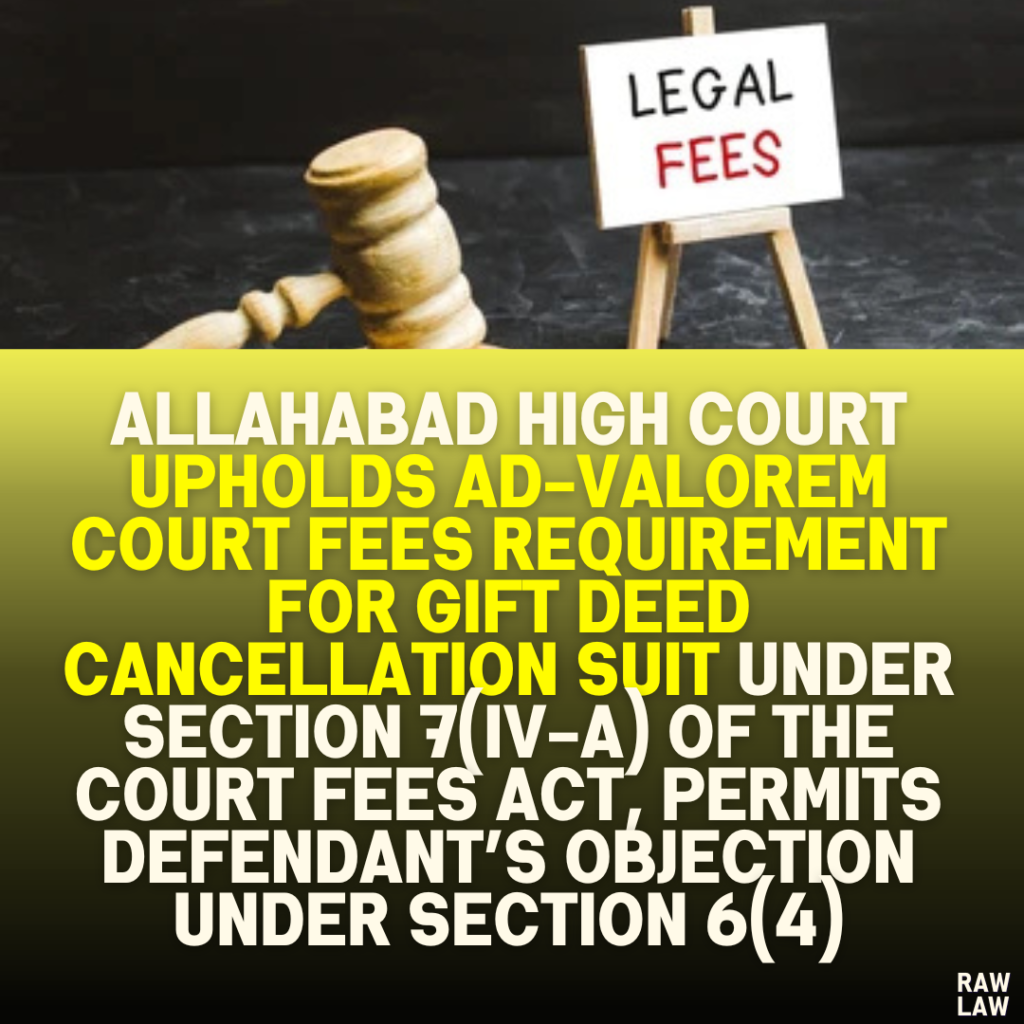Court’s Decision
The Allahabad High Court dismissed the appeal filed by the plaintiff-appellant challenging the trial court’s order, which required her to pay ad-valorem court fees based on the market value of the disputed property. The court held that the relief sought for declaring the gift deed as null, void, forged, and fabricated falls under Section 7(iv-A) of the Court Fees Act, 1870, not Article 17(iii) of Schedule II, as argued by the appellant.
Facts
The appellant filed a suit seeking a declaratory decree to nullify a gift deed, which she alleged was fraudulently executed by her son under the guise of a power of attorney. The appellant claimed that the fixed court fee was sufficient under Article 17(iii) of Schedule II of the Court Fees Act, arguing that she had not sought any consequential relief. The trial court, however, ruled that the nature of the relief demanded necessitated the payment of ad-valorem court fees under Section 7(iv-A).
Issues
The primary issue was whether the plaintiff’s suit, aimed at declaring a gift deed null and void, required an ad-valorem court fee under Section 7(iv-A) of the Court Fees Act, 1870, or if a fixed fee under Article 17(iii) sufficed.
Petitioner’s Arguments
The appellant contended that the relief sought was merely declaratory, thus falling within the ambit of Article 17(iii) of Schedule II, which requires a fixed fee. She argued that Section 7(iv-A), applicable only to suits for cancellation of an instrument, was not relevant in this case since her claim did not seek cancellation but rather a declaration of nullity. She further asserted that the defendant, her son, had no right to challenge the sufficiency of the court fee.
Respondent’s Arguments
The respondent countered that Section 7(iv-A) of the Act applied because the plaintiff sought to have the gift deed adjudged null and void. He supported the trial court’s order, arguing that the case did not fall under the residual category of Article 17(iii) since it involved the adjudication of an instrument’s validity.
Analysis of the Law
The court examined Article 17(iii) and Section 7(iv-A) of the Court Fees Act, noting that Article 17(iii) applies to declaratory suits with no consequential relief, provided they are not covered by other provisions. In contrast, Section 7(iv-A) pertains specifically to suits involving the adjudication of instruments as void or voidable, requiring ad-valorem fees based on property value when the plaintiff was a party to the instrument.
Precedent Analysis
The court referenced relevant case law, including:
- Shailendra Bharadwaj v. Chandra Pal – establishing that Section 7(iv-A) applies when an instrument is sought to be adjudged void.
- Ajay Tiwari v. Hriday Ram Tiwari – clarifying the conflict between Article 17(iii) and Section 7(iv-A), concluding that for nullifying an instrument, ad-valorem fees under Section 7(iv-A) are necessary.
- Ratnavaramaraja v. Vimla – which was distinguished, as it addressed limitations on defendants’ objections regarding court fees, deemed irrelevant as this appeal was initiated by the plaintiff herself.
Court’s Reasoning
The court reasoned that the appellant’s relief sought went beyond a simple declaratory decree, as it directly involved the adjudication of the gift deed’s validity, making Section 7(iv-A) applicable. The court further held that defendants could raise objections on court fees under Section 6(4) of the Act, affirming the defendant’s right to challenge the court fee adequacy.
Conclusion
The Allahabad High Court found no error in the trial court’s order, thereby dismissing the appeal and directing the appellant to comply with the ad-valorem fee requirement.
Implications
This decision reinforces the applicability of Section 7(iv-A) for suits involving the adjudication of instruments, underscoring that such claims, even when framed as declaratory, may necessitate ad-valorem court fees when the instrument’s validity is at issue.




Pingback: Delhi High Court Upholds Conviction Under POCSO Act: Minor’s Consistent Testimony Deemed Sufficient for Guilt Despite Lack of Medical Evidence and Appellant’s Failure to Rebut Presumption - Raw Law